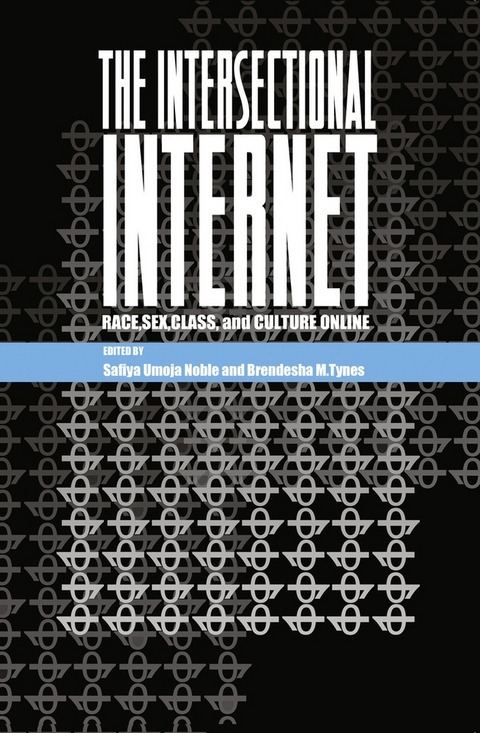
The Intersectional Internet
Peter Lang Publishing Inc (Verlag)
978-1-4331-3001-4 (ISBN)
From race, sex, class, and culture, the multidisciplinary field of Internet studies needs theoretical and methodological approaches that allow us to question the organization of social relations that are embedded in digital technologies, and that foster a clearer understanding of how power relations are organized through technologies.
Representing a scholarly dialogue among established and emerging critical media and information studies scholars, this volume provides a means of foregrounding new questions, methods, and theories which can be applied to digital media, platforms, and infrastructures. These inquiries include, among others, how representation to hardware, software, computer code, and infrastructures might be implicated in global economic, political, and social systems of control.
Contributors argue that more research needs to explicitly trace the types of uneven power relations that exist in technological spaces. By looking at both the broader political and economic context and the many digital technology acculturation processes as they are differentiated intersectionally, a clearer picture emerges of how under-acknowledging culturally situated and gendered information technologies are impacting the possibility of participation with (or purposeful abstinence from) the Internet.
This book is ideal for undergraduate and graduate courses in Internet studies, library and information studies, communication, sociology, and psychology. It is also ideal for researchers with varying expertise and will help to advance theoretical and methodological approaches to Internet research.
Safiya Umoja Noble (PhD, University of Illinois at Urbana-Champaign) is an assistant professor in the Department of Information Studies in the Graduate School of Education and Information Studies at UCLA. She is co-editor of Emotions, Technology, and Design (2016) and an editorial board member of the Journal of Critical Library and Information Studies. Brendesha M. Tynes (PhD, UCLA) is Associate Professor of Education and Psychology at the University of Southern California. She is the recipient of the American Educational Research Association Early Career Award and the Spencer Foundation Midcareer Award.
Contents: Brendesha M. Tynes/Joshua Schuschke/Safiya Umoja Noble: Digital Intersectionality Theory and the #Blacklivesmatter Movement – Jessie Daniels: The Trouble With White Feminism: Whiteness, Digital Feminism, and the Intersectional Internet – Myra Washington: Asian/American Masculinity: The Politics of Virility, Virality, and Visibility – Catherine Knight Steele: Signifyin’, Bitching, and Blogging: Black Women and Resistance Discourse Online – Aymar Jean Christian: Video Stars: Marketing Queer Performance in Networked Television – Jenny Ungbha Korn: Black Women Exercisers, Asian Women Artists, White Women Daters, and Latina Lesbians: Cultural Constructions of Race and Gender Within Intersectionality-Based Facebook Groups – David J. Leonard: Grand Theft Auto V: Post-Racial Fantasies and Ferguson Realities – Sarah T. Roberts: Commercial Content Moderation: Digital Laborers’ Dirty Work – Molly Niesen: Love, Inc.: Toward Structural Intersectional Analysis of Online Dating Sites and Applications – Ergin Bulut: The Nation-State in Intersectional Internet: Turkey’s Encounters With Facebook and Twitter – Melissa Villa-Nicholas: The Invisible Information Worker: Latinas in Telecommunications – Miriam E. Sweeney: The Intersectional Interface – Robert Mejia: The Epidemiology of Digital Infrastructure – Tiera Chante’ Tanksley: Education, Representation, and Resistance: Black Girls in Popular Instagram Memes Contributors.
| Erscheinungsdatum | 05.02.2016 |
|---|---|
| Reihe/Serie | Digital Formations ; 105 | Digital Formations ; 105 |
| Mitarbeit |
Herausgeber (Serie): Steve Jones |
| Verlagsort | New York |
| Sprache | englisch |
| Maße | 155 x 230 mm |
| Gewicht | 500 g |
| Themenwelt | Mathematik / Informatik ► Informatik |
| Sozialwissenschaften ► Kommunikation / Medien ► Allgemeines / Lexika | |
| Sozialwissenschaften ► Kommunikation / Medien ► Kommunikationswissenschaft | |
| Sozialwissenschaften ► Kommunikation / Medien ► Medienwissenschaft | |
| Sozialwissenschaften ► Soziologie | |
| ISBN-10 | 1-4331-3001-7 / 1433130017 |
| ISBN-13 | 978-1-4331-3001-4 / 9781433130014 |
| Zustand | Neuware |
| Haben Sie eine Frage zum Produkt? |
aus dem Bereich


